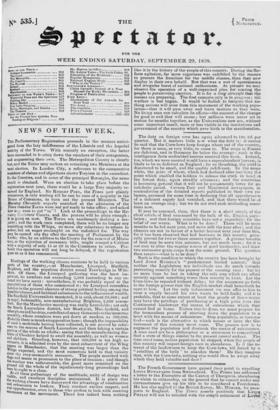The duty on foreign corn has again advanced to 10s.
8d. per quarter. But it matters little now what the duty is : it cannot be said that the Corn-laws keep foreign wheat out of the country, for there is none, or very little, to come in. The Crops in France are deficient, and in Germany far below the average : such is the intelligence from undoubted sources received this week. Ireland, too, which we were assured would have a superabundant harvest, is likely to be as deficient as England ; for on thrashing, the yield is discovered to be small, and the quality indifferent. In the mean while, the price of wheat, which hacl declined after tonehine tie Point which enabled the holders to release the stock in bond et the lowest duty, again steadily advances ; and the conviction is becoming general that it will not be permanently louver for an indefinite period. Certain Tory and Ministerial newspapers, in contradiction of the detailed reports published in their own co- lumns, persisted for some time in declaring that all apprehension. of a deficient supply had vanished, and that there would be et least an average crop ; but we do not read such misleading asser- tions now.
It may be assumed, then, that there is a short supply of the chief article of food consumed by the bulk of the Engiih popu- lation; and that foreign countries have not a superfluity for the relief of our wants. What is to be done? There will, be more mouths to be fed next year, and more still the year after; and the chances are not in favour of a better harvest next year than this, for it has been observed that bad harvests in this country gene- rally prevail for two or three seasons together. A greater breadth of land may be sown this autumn, but not much more ; for it is not easy to alter the regular ceuree of good husbandry, and draw two successive grain crops from the same ground. The question then recurs—what is to be done?
Such is the condition to which the country has been brought by Lord Jotter RUSSELL'S " predominant landed interest," that neither the Legislature nor individuals can do much towards preventing scarcity for the present or the ensuing year : but let no more time be lost in taking the only step which can afford security against something worse than scarcity in 1840. Let the Corn-laws be repealed without delay; let the assurance go forth to the foreign grower that the English market shall henceforth be open to him. Let the only inducement we can offer to him to raise a supply beyond his own wants be held forth; and it is probable, that to some extent at least the people of this ceuntry may have the privilege of purchasing at a high price from the Continental landowner the means of subsistence which they cannot find at home. Unless this be done, we must prepare fur the tremendous process of starving down the population to a level with the means of subsistence. Stop population, or increase food—such is the alternative to which sooner or later the Go- vernment of this country must come. The process now is to augment the population and diminish the means of subsistence. A man need not be a philosopher or a statesman to comprehend that a state of things similar to the present cannot endure. The time must come, unless population be stopped, when the people of this country will import foreign corn in abundance. Is it the in- terest of the landowners to keep the Corn-laws, till forced by a "rebellion of the belly" to abandon them? Do they imagine that, with the Corn-laws, nothing else would then be swept away which they hold valuable and dear ?


























